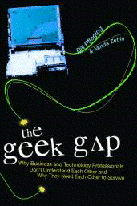What Interns Are Up To
So last week I told you how we'd discovered The Geek Gap being discussed in a discussion group of the blog Joel on Software. The "Joel" was Joel Spolsky and the funny thing was we'd just watched him on the Documentary Channel. Fantastic channel, by the way!
The documentary was called Aardvark'd: 12 Weeks with Geeks and takes place at Fog Creek Software, Joel's company.
It's the story of four geek interns who travel to New York City to work at Fog Creek for a summer and build a piece of software codenamed Aardvark. We both thought it was pretty good--check it out if you get a chance--but as usual, we didn't completely agree. I wanted a tiny bit less air time devoted to geeks doing something other than their jobs--growing tomatoes or playing games in the office, and a tiny bit more time spent on the actual software they were creating. Bill thought it was perfect just the way it was. "You don't understand," he said. "It makes geeks look really cool!" Anything that glamorizes geeks is very satisfying, I guess because so many of them spent so many years feeling marginalized.
Later I read on Joel's site that he'd initiated the project out of frustration over the stupid business problems contestants have to solve on The Apprentice. From that perspective, the focus on social lives and such makes complete sense. And anyhow, I'm a business technology writer, so of course I want nitty-gritty details that would probably bore the average viewer.
Anyhow, the coolest thing about it was the software they wound up creating. Called Copilot it allows you to use the Internet and, with their permission, take over control of someone else's computer. Why would they want you to do this? Because they want tech support, and it's a lot easier to just take over someone's computer and do what needs to be done than walk someone through a complex operation over the phone. "Now click that button--no not that one!" is how Bill describes it. The great thing about Copilot is neither he nor they needs to buy or install any special software--they just go to a web site and punch in an invitation number.
He can't wait to try it out!
The documentary was called Aardvark'd: 12 Weeks with Geeks and takes place at Fog Creek Software, Joel's company.
It's the story of four geek interns who travel to New York City to work at Fog Creek for a summer and build a piece of software codenamed Aardvark. We both thought it was pretty good--check it out if you get a chance--but as usual, we didn't completely agree. I wanted a tiny bit less air time devoted to geeks doing something other than their jobs--growing tomatoes or playing games in the office, and a tiny bit more time spent on the actual software they were creating. Bill thought it was perfect just the way it was. "You don't understand," he said. "It makes geeks look really cool!" Anything that glamorizes geeks is very satisfying, I guess because so many of them spent so many years feeling marginalized.
Later I read on Joel's site that he'd initiated the project out of frustration over the stupid business problems contestants have to solve on The Apprentice. From that perspective, the focus on social lives and such makes complete sense. And anyhow, I'm a business technology writer, so of course I want nitty-gritty details that would probably bore the average viewer.
Anyhow, the coolest thing about it was the software they wound up creating. Called Copilot it allows you to use the Internet and, with their permission, take over control of someone else's computer. Why would they want you to do this? Because they want tech support, and it's a lot easier to just take over someone's computer and do what needs to be done than walk someone through a complex operation over the phone. "Now click that button--no not that one!" is how Bill describes it. The great thing about Copilot is neither he nor they needs to buy or install any special software--they just go to a web site and punch in an invitation number.
He can't wait to try it out!



